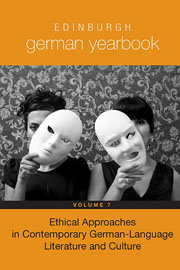 Edinburgh German Yearbook 7
Edinburgh German Yearbook 7 Book contents
- Frontmatter
- Contents
- Introduction: Ethical Approaches in Contemporary German-Language Literature and Culture
- “The Absoluteness of the Knowledge Once Possessed”: 1968 Ethics and Consensual Ethics in Uwe Timm's Novel Rot
- What the World Needs Now: Rancière, Ethology, and Christian Petzold's Toter Mann (2001) and Wolfsburg (2003)
- Materiality and Ethics in Recent German Prose Narratives by Angelika Overath and Angela Krauß
- Shameful Stories: The Ethics of East German Memory Contests in Fiction by Julia Schoch, Stefan Moster, Antje Rávic Strubel, and Judith Schalansky
- Affective Encounters and Ethical Responses in Robert Schneider's Die Luftgängerin and Sybille Berg's Vielen Dank für das Leben
- Narrative Ethics and the Problems of Age and Aging in Annette Pehnt's Haus der Schildkröten
- “So ähnlich könnte es gewesen sein, aber […]”: Unethical Narrations of Emily Ruete's “Große Wandlungen”
- Enlightenment Fundamentalism: Zafer Şenocak, Navid Kermani, and Multiculturalism in Germany Today
- Voicing Rupture: Ethical Concerns in Short Prose and Lyric Texts by Yoko Tawada
“The Absoluteness of the Knowledge Once Possessed”: 1968 Ethics and Consensual Ethics in Uwe Timm's Novel Rot
Published online by Cambridge University Press: 05 December 2013
- Frontmatter
- Contents
- Introduction: Ethical Approaches in Contemporary German-Language Literature and Culture
- “The Absoluteness of the Knowledge Once Possessed”: 1968 Ethics and Consensual Ethics in Uwe Timm's Novel Rot
- What the World Needs Now: Rancière, Ethology, and Christian Petzold's Toter Mann (2001) and Wolfsburg (2003)
- Materiality and Ethics in Recent German Prose Narratives by Angelika Overath and Angela Krauß
- Shameful Stories: The Ethics of East German Memory Contests in Fiction by Julia Schoch, Stefan Moster, Antje Rávic Strubel, and Judith Schalansky
- Affective Encounters and Ethical Responses in Robert Schneider's Die Luftgängerin and Sybille Berg's Vielen Dank für das Leben
- Narrative Ethics and the Problems of Age and Aging in Annette Pehnt's Haus der Schildkröten
- “So ähnlich könnte es gewesen sein, aber […]”: Unethical Narrations of Emily Ruete's “Große Wandlungen”
- Enlightenment Fundamentalism: Zafer Şenocak, Navid Kermani, and Multiculturalism in Germany Today
- Voicing Rupture: Ethical Concerns in Short Prose and Lyric Texts by Yoko Tawada
Summary
“How is it possible for one to no longer be the subject of a truth?” asks Alain Badiou, one of the most significant and original French philosophers of the generation succeeding Foucault, Derrida, and Lyotard. The protagonist of Uwe Timm's novel Rot (2001), Thomas Linde, a former activist in the student movement, had tried to shut out such unsettling questions as much as possible. Twelve days before the story begins, though, he learns that a former comrade, of whom he had lost track for more than twenty years, has died. The news functions as a catalyst for a process in which the protagonist is again gripped by the “Rigorismus seiner Jugend.” Linde is killed in a car accident, and the novel leaves it open whether he would have been able to become “the subject of a truth” and to commit himself to the “Unbedingtheit des einmal Erkannten” (R 379). However, much of the richness and complexity of this novel originates from the clash between what one might call his revived 1968 ethics and what Alain Badiou would term the “consensual ‘ethics’” of this protagonist's social environment (E 32).
- Type
- Chapter
- Information
- Edinburgh German Yearbook 7Ethical Approaches in Contemporary German-Language Literature and Culture, pp. 13 - 28Publisher: Boydell & BrewerPrint publication year: 2013


